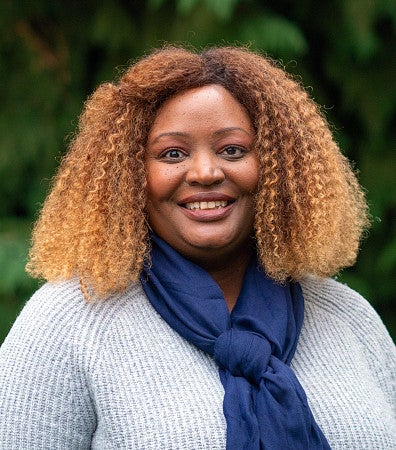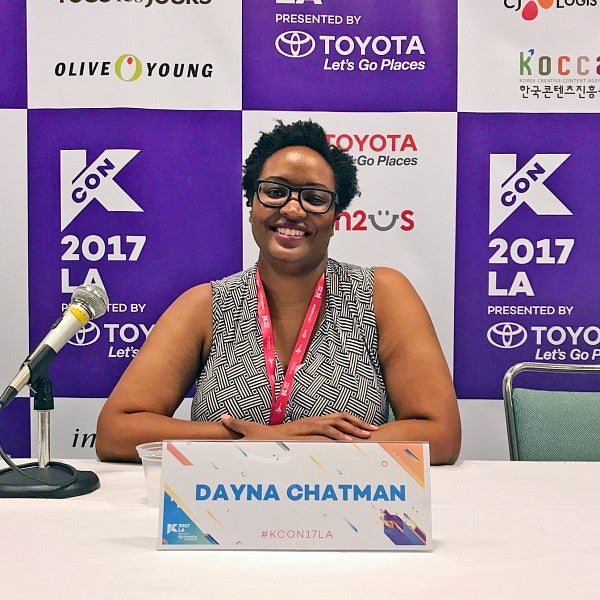
Have you ever wondered how the music genre K-pop amassed such a large following across the globe? Assistant professor of media studies Dayna Chatman did. Today she’s an expert who researches the origins of K-pop—short for Korean popular music—and its multicultural and transnational relevance.
Chatman, who teaches and researches in the media studies major at the UO School of Journalism and Communication (SOJC), was first introduced to K-pop in 2014 on a trip to South Korea. Before then, the only K-pop song she’d heard was the famous “Gangnam Style” by PSY, which went viral in 2012. As Chatman listened to and learned more about the genre, she noticed connections between K-pop and the American pop, hip-hop and R&B she grew up with in the late 1990s and early 2000s. This piqued her interest as a media studies researcher.
Digging deeper, Chatman discovered that modern K-pop artists intentionally recreated the rhythm and beat of popular Black American music. During the Korean War, soldiers brought over American music, and it was swiftly popularized through South Korean cover songs. However, simple cover songs eventually turned into a new style of music drawn from historically Black American music genres.
Chatman explains that in the 1980s, future Korean music executives such as Lee Soo Man of SM Entertainment and Park Jin Young of JYP Entertainment spent time in the United States and were introduced to the R&B and hip-hop music of the time. Upon returning to Korea, these executives created K-pop, combining uniquely Korean song structures with the sound of Western music genres.
Intrigued by the expansion of these genres into South Korea and its popularity, Chatman completely immersed herself in the K-pop industry as an “academic fan”—someone who is a fan in the traditional sense, but also does research on fandom and fan culture.
During her research, she studied videos of Black American K-pop fans reacting to the music on streaming channels like YouTube.
“I started noticing a lot of visibility of Black fans in that realm in particular, which I found interesting because I think that for many within the Black community, being a fan of something outside the Black community is seen as kind of like, you're different, right?” Chatman said.
As she continued her research, Chatman wondered more about how Black fans entered K-pop fandom, and if they felt that the music was inclusive.
While Chatman was drawn to K-pop because of its familiar and nostalgic sound, she describes some aspects of the industry that have been uncomfortable for her to navigate. For instance, early in her introduction to K-pop, she watched the Korean television program “American Life Hustle,” a show in which then-rookie group BTS is told their year of hard work has earned them a vacation to Los Angeles. However, the producers stage a kidnapping of the band by a few Black men who yell and aggressively enter the physical space of the young idols. The band members speak very little English, and although cameras surround them, they appear terrified and confused. The band soon finds out the truth: They had been sent to get an “education in hip-hop” by TV show producers and their management agency. In addition to this scene in the first episode, the program perpetuates stereotypes and even features an episode where Black women are used as props in a fictitious music video.
“It was regurgitating a view of Black American culture to a South Korean audience that was problematic,” Chatman said.

Chatman has found some of the language used by K-pop idols disturbing as well. Members of some K-pop bands have used the N-word, either when performing covers songs or off-handedly in conversations captured on video and accidentally posted on the internet.
When Black fans voice their displeasure with these incidents, Chatman said, “Other fans often ostracized Black fans because they are seen as haters or just angry for no reason.”
Often, Chatman found, non-Black fans used the justification that K-pop artists shouldn’t be held accountable because they aren’t aware of the history of Black marginalization in the United States. Fans continued to debate these issues, which has become a point of controversy within the various K-pop fandom communities.
“My interest became: How do Black fans navigate this experience of a genre of music that gives them pleasure, but also these moments that they feel are insensitive to them, and then how do they combat that within the fandom?” Chatman said.
Chatman views her research as a service to the fandom she’s a part of. By assessing the ways her fellow Black fans engage with these issues through online platforms, she hopes to educate others on issues relating to the Black experience in America.
Through her research, Chatman illuminates “the various communities that Black Americans are involved in that are on the margins.” Her realization that Black American audiences and fans are often absent from audience reception studies and fan/fandom studies led her to this work.
“What drove my interest beyond my status as a fan is a desire to say there's this whole group of people who are media consumers whose experiences are not being documented in the way others have been,” Chatman said.
At the SOJC, Chatman teaches core context courses such as Gender, Media and Diversity. She also teaches specialized media studies courses within the media studies major’s media, culture and power pathway that focuses on the Black experience in America.
In addition to several small pieces in alternative media journals, Chatman is working on a lengthier piece about the challenges Black K-pop fans experience when using social media platforms to address racially insensitive actions or comments by idols. In one instance, multiple hashtags that Black fans used on a K-pop fan-oriented social media application meant for sharing common experiences were removed due to numerous instances of racism by non-Black fans. Although this move combatted the racist commentary, it stifled Black K-pop fans’ voices on the app.
Chatman always looks forward to discussing her research with SOJC students, as fandom studies intersects with all majors in the school.
Before coming to the SOJC, Chatman was a post-doctoral fellow at the University of Pennsylvania. She earned her doctorate from the University of Southern California Annenberg School for Communication and Journalism. Chatman’s identity as a Black woman is what drove her to specialize in media and representational intersectionality. Chatman takes a critical approach to studying media and its impact on systemically oppressed groups within society. Instead of viewing media as merely an outlet for entertainment and enjoyment, Chatman encourages us to consider the systems of power that uplift or exclude various identities that pervade modern media.
You can read some of Chatman’s recent work in “Flow: A Critical Forum on Media and Culture.” You can also learn more about Chatman and her research in her Q&A profile from 2018, when she first arrived at the SOJC.
—By Lauren Tokos, class of ’24
Lauren Tokos (she/her/hers) is in her third year majoring in media studies with a minor in business administration. She is also a student in the Clark Honors College and a member of the Wayne Morse Scholars Program.
